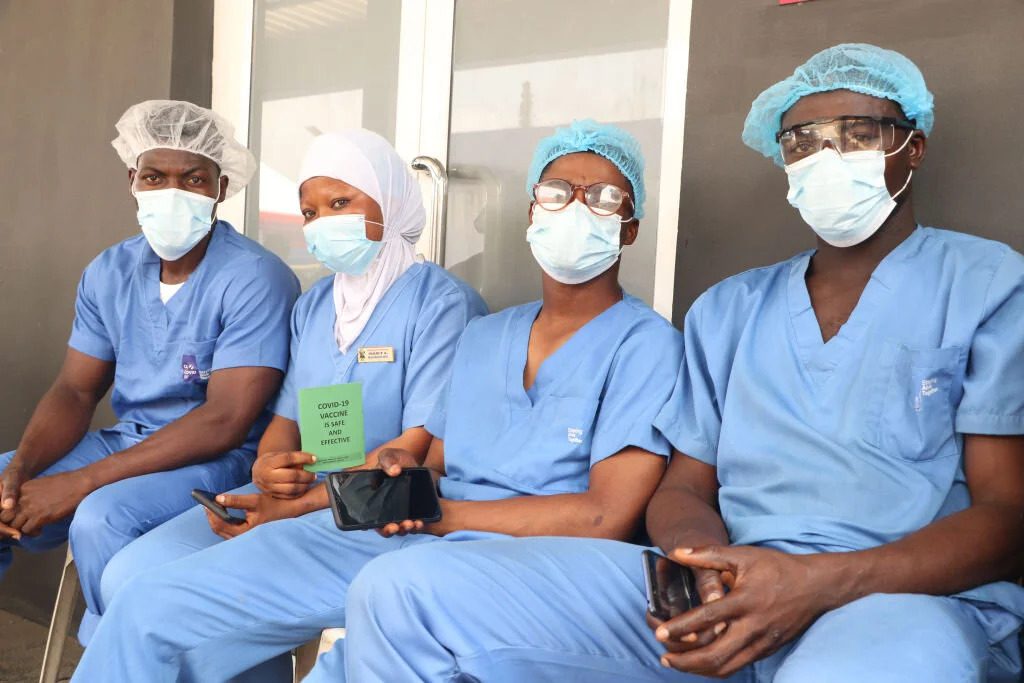In recent years, the term “Japa wave” has become a cultural shorthand in Nigeria, encapsulating the mass exodus of young, talented professionals seeking better opportunities abroad. This phrase, popularized on Nigerian social media, reflects the hope of a better life abroad but underscores a deeper loss for the continent. This brain drain crisis, sweeping across Nigeria and the broader African continent, is particularly devastating in the healthcare and academic sectors, where the loss of skilled professionals threatens the very foundation of development.
Driven by poor working conditions, inadequate pay, and systemic underdevelopment, health workers and academics are increasingly looking beyond Africa’s borders, not only to prosperous nations like the United Kingdom, United States, Canada, and Australia but also to middle-income countries on other continents out of desperation for better opportunities. Each year, tens of thousands of Africans, especially Nigerians, flood foreign embassies, spending thousands of dollars on visa applications in pursuit of a better life. For example, the British High Commission in Nigeria issued a whopping 255,000 visas in the 12 months from April 2023-March 2024. Social media platforms are filled with triumphant posts proclaiming, “Welcome to a new dispensation,” signaling successful relocations abroad. Yet, this celebratory narrative masks a deeper crisis: who will build Africa’s future if its best minds and hands are elsewhere?
The brain drain crisis is not new, but its intensity has surged in recent years. In Nigeria, a colloquial term has emerged to capture this phenomenon: the “Japa wave,” reflecting the mass exodus of skilled professionals seeking better prospects abroad. In Nigeria’s healthcare sector, the Medical & Dental Council of Nigeria noted that over half of the country’s registered doctors have left in the past decade, lured by streamlined recruitment processes in countries like the UK and the US. Nurses and other health workers follow suit, leaving hospitals understaffed and overburdened. In the last 3 years (2022-2024), about 42,000 nurses have left Nigeria, with a large number moving to the United Kingdom, accounting for the largest portion of the NHS nursing workforce from sub-Saharan Africa in Great Britain. A report by the Organization for Economic Co-operation and Development stated that there were more than 23400 health professionals from South Africa residing and working in the United Kingdom, New Zealand, the United States and Australia. Those who remain often work in deteriorated facilities with outdated equipment, irregular salaries, and little institutional support.
The situation is compounded by incessant strikes led by unions such as the Nigerian Association of Resident Doctors (NARD) and the National Association of Nigeria Nurses and Midwives (NANNM), who protest poor working conditions and unpaid wages. These strikes, while often justified, disrupt healthcare delivery, further eroding public trust in the system. The crisis extends beyond healthcare as the story is equally grim in academia. Young scholars face meager salaries, limited research funding, and under-resourced university infrastructure. The Academic Staff Union of Universities (ASUU) frequently resorts to strikes to demand better funding and conditions, yet these actions yield little lasting change. In university classrooms, meant to nurture the next generation of leaders, lecturers often advise students to “plan for abroad” after graduation, a stark acknowledgment that Nigeria offers little to keep its brightest minds.
Africa’s workforce hemorrhage is significantly aggravated by the stark hypocrisy of its political leadership, whose actions undermine public trust and exacerbate systemic failures. Political elites and their families routinely seek high-quality medical treatment and education in Western countries, bypassing the dilapidated local systems they are tasked with strengthening. This disconnect fosters widespread disillusionment among professionals, who see limited efforts to address systemic challenges. Why should a skilled doctor remain in a neglected hospital, struggling with outdated equipment and chronic shortages, when the politicians overseeing healthcare seek treatment in foreign clinics? Why should an academic persevere in a poorly funded university, contending with overcrowded classrooms and scarce research opportunities, when the children of the elite attend prestigious institutions abroad? This double standard not only accelerates the brain drain but also strips governments of any moral authority when they call for national loyalty or urge citizens to “stay and build the nation.” By prioritizing personal gain over collective progress, such leadership perpetuates a vicious cycle of neglect that stifles development, undermines public confidence, and deepens the loss of its critical human capital.
Compounding these internal failures, global economic dynamics play a significant role. Western nations, facing shortages due to aging populations, actively recruit African professionals through recruitment fairs, streamlined visa programmes and agencies whilst offering salaries and conditions unattainable at home.
The consequences of this exodus are profound and multifaceted.
In healthcare, the loss of doctors, nurses, and other professionals has left an already fragile system on the brink. Patients face longer wait times, reduced quality of care, and, in some cases, preventable deaths. Rural areas, already underserved, are hit hardest, as remaining professionals gravitate toward urban centers or leave entirely.
In academia, the departure of talented scholars stifles innovation, weakens research output, and erodes the intellectual foundation needed for national progress. While remittances from the African diaspora (estimated at $95 billion annually across the continent) provide significant economic support to families and communities, they cannot replace the institutional knowledge, expertise, and leadership lost when professionals leave. The best and brightest, who could drive advancements in science, technology, and governance, are instead contributing to the prosperity of foreign nations.
Financially, the cost is astronomical: Nigeria invests billions of dollars in training professionals, only to lose them to countries that reap the benefits without bearing the cost. According to the Mo Ibrahim Foundation, it costs an African country between $21,000 and $51,000 to train just one doctor.
Socially, the impact is even more devastating. Communities lose role models, and the hope of a brighter future dims as the cycle of underdevelopment perpetuates itself. The frequent strikes by different trade unions further highlight the desperation of professionals who feel unheard and undervalued, yet these actions often lead to public frustration rather than systemic reform.
The question, then, is how long this trend can continue. The Japa wave is not merely a Nigerian problem but a continental crisis that demands urgent action. African governments must confront the root causes of brain drain with bold, decisive measures. Investing in modern healthcare facilities, reliable equipment, and competitive salaries is essential to the retention of health workers. For example, Ethiopia has successfully curbed healthcare worker emigration through its Health Workforce Improvement Program, which combines subsidies, career development initiatives, and non-financial incentives to enhance the welfare of medical professionals. This approach significantly reduced the percentage of health workers intending to leave their jobs, from 49% in 2014 to 17.5% in 2022.
Universities require robust funding to support cutting-edge research, attract global talent, and provide scholarships and grants that incentivize academics to stay. Policy reforms must simplify bureaucratic procedures, guarantee timely salary payments, and establish clear career advancement pathways. Governments should also foster international collaborations to keep local talent engaged with global opportunities without needing to leave. Ethiopia’s innovative approach to retaining healthcare workers by launching a series of subsidies and career development initiatives aimed at improving the welfare of its health workforce as well as implementing a range of non-financial incentives through its Health Workforce Improvement Program (HWIP). The impact was significant: the percentage of health workers intending to leave their jobs dropped from 49% in 2014 to just 17.5% in 2022. Most critically, African leaders must lead by example, demonstrating faith in their own systems by using local healthcare and education services. Only then can they credibly call for professionals to stay and build the continent’s future.
The Westward migration by skilled Africans reflects a deep yearning for dignity, opportunity, and stability, which are values that African governments must prioritize to reverse this tide. While migration is a personal choice, it is the responsibility of leaders to create an environment where staying is not just viable but desirable. The continent’s future depends on its ability to retain and empower its healthcare workers, academics, and other skilled professionals—those who heal its people and shape its intellectual capital. As young Africans continue to post “Welcome to a new dispensation” on their social media, the urgent challenge for African governments is to usher in a new dispensation at home, one where the best and brightest see a future worth staying for.
The time for introspection and action is now. Africa cannot afford to lose its human capital indefinitely, and the responsibility lies with its leaders to build a continent where its brightest minds choose to stay and thrive.





